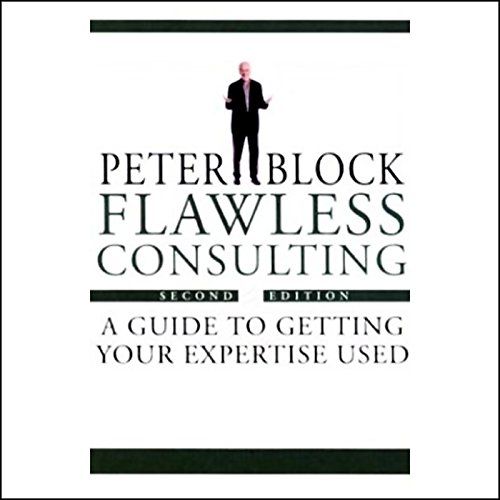Flawless Consulting – Peter Block

“Flawless Consulting” covers a range of topics, including how to build effective client relationships, how to gather and analyze data, how to facilitate change, and how to manage the consulting process from start to finish.
The Role of the Consultant
Consultants should see themselves as partners with their clients, working collaboratively to achieve the client’s goals. The consultant’s role is to provide expertise, guidance, and support, while respecting the client’s autonomy and expertise.
Consultants should be aware of their own biases and limitations and strive to build strong relationships with their clients based on trust, respect, and open communication.
Building Teams
Consulting often involves working with teams, and consultants should be skilled at building and managing teams effectively. This involves understanding team dynamics, establishing clear goals and roles, and creating an environment of trust and collaboration.
Effective team building requires strong leadership skills, excellent communication, and a willingness to address conflict and resolve issues in a constructive manner.
Continual Learning and Development
Consulting is a constantly evolving field, and consultants must be committed to ongoing learning and development. This involves staying up-to-date with the latest trends and best practices, seeking feedback and support from peers and mentors, and investing in professional development opportunities. Consultants should also be open to feedback and willing to learn from their mistakes and failures.
Balancing Personal and Professional Life
Finally, consultants must be able to balance their personal and professional lives effectively. This involves setting clear boundaries, managing their time and energy effectively, and maintaining a healthy work-life balance.
Managing the Consulting Process
Managing the consulting process effectively is critical to success. This involves setting clear expectations, defining roles and responsibilities, and establishing a clear scope of work.
It’s also important to manage the client’s expectations, communicate regularly and effectively, and ensure that the consulting work stays on track and within budget.
Building Relationships with Clients
Effective consulting requires building strong relationships with clients. Consultants should strive to understand the client’s needs, values, and culture, and work to establish trust and rapport. This involves active listening, open communication, and a willingness to adapt to the client’s style and approach.
Consultants should also be clear about their own values, boundaries, and expectations, and be willing to negotiate and collaborate with clients to achieve mutual goals.
Communication and Feedback
Effective communication is essential to successful consulting. This involves listening actively, asking questions, and providing feedback in a constructive and supportive manner.
Consultants should also be skilled at presenting information in a clear and compelling way, and be able to adapt their communication style to meet the needs of different stakeholders.
Ethical Considerations
Consultants have a responsibility to act ethically and with integrity at all times. This involves being transparent about their fees and billing practices, avoiding conflicts of interest, and maintaining confidentiality and privacy.
Consultants should also be aware of their own biases and limitations, and strive to provide objective and impartial advice that is in the best interests of their clients.
Understanding and Defining the Problem
Before any consulting work can begin, it’s essential to understand and define the problem or issue that the client is facing. This involves asking questions, gathering data, and analyzing information to gain a comprehensive understanding of the situation.
Consultants should work with clients to identify their underlying values, beliefs, and assumptions, and explore how these may be influencing the problem and its potential solutions.
Facilitating Change
Consultants play a key role in facilitating change within organizations. This involves creating a shared vision of the future, identifying opportunities for improvement, and developing strategies for implementing and sustaining change.
Effective change management requires a collaborative approach that involves engaging stakeholders, building support, and communicating effectively at all levels of the organization.



Comments ()